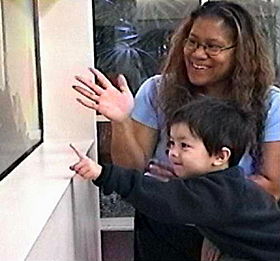Treatments for autism
| Autism therapies | |
|---|---|
| Intervention | |

A three-year-old with autism points to fish in an aquarium, as part of an experiment on the effect of intensive shared-attention training on language development.
|
Autism therapies are interventions that attempt to lessen the deficits and problem behaviours associated with autism spectrum disorder (ASD) in order to increase the quality of life and functional independence of autistic individuals. Treatment is typically catered to person's needs. Treatments fall into two major categories: educational interventions and medical management. Training and support are also given to families of those with ASD.
Studies of interventions have some methodological problems that prevent definitive conclusions about efficacy. Although many psychosocial interventions have some positive evidence, suggesting that some form of treatment is preferable to no treatment, the systematic reviews have reported that the quality of these studies has generally been poor, their clinical results are mostly tentative, and there is little evidence for the relative effectiveness of treatment options. Intensive, sustained special education programs and behavior therapy early in life can help children with ASD acquire self-care, social, and job skills, and often can improve functioning, and decrease symptom severity and maladaptive behaviors; claims that intervention by around age three years is crucial are not substantiated. Available approaches include applied behavior analysis (ABA), developmental models, structured teaching, speech and language therapy, social skills therapy, and occupational therapy. Educational interventions have some effectiveness in children: intensive ABA treatment has demonstrated effectiveness in enhancing global functioning in preschool children, and is well established for improving intellectual performance of young children. Neuropsychological reports are often poorly communicated to educators, resulting in a gap between what a report recommends and what education is provided. The limited research on the effectiveness of adult residential programs shows mixed results.
Many medications are used to treat problems associated with ASD. More than half of U.S. children diagnosed with ASD are prescribed psychoactive drugs or anticonvulsants, with the most common drug classes being antidepressants, stimulants, and antipsychotics. Aside from antipsychotics, there is scant reliable research about the effectiveness or safety of drug treatments for adolescents and adults with ASD. A person with ASD may respond atypically to medications, the medications can have adverse effects, and no known medication relieves autism's core symptoms of social and communication impairments.
...
Wikipedia
